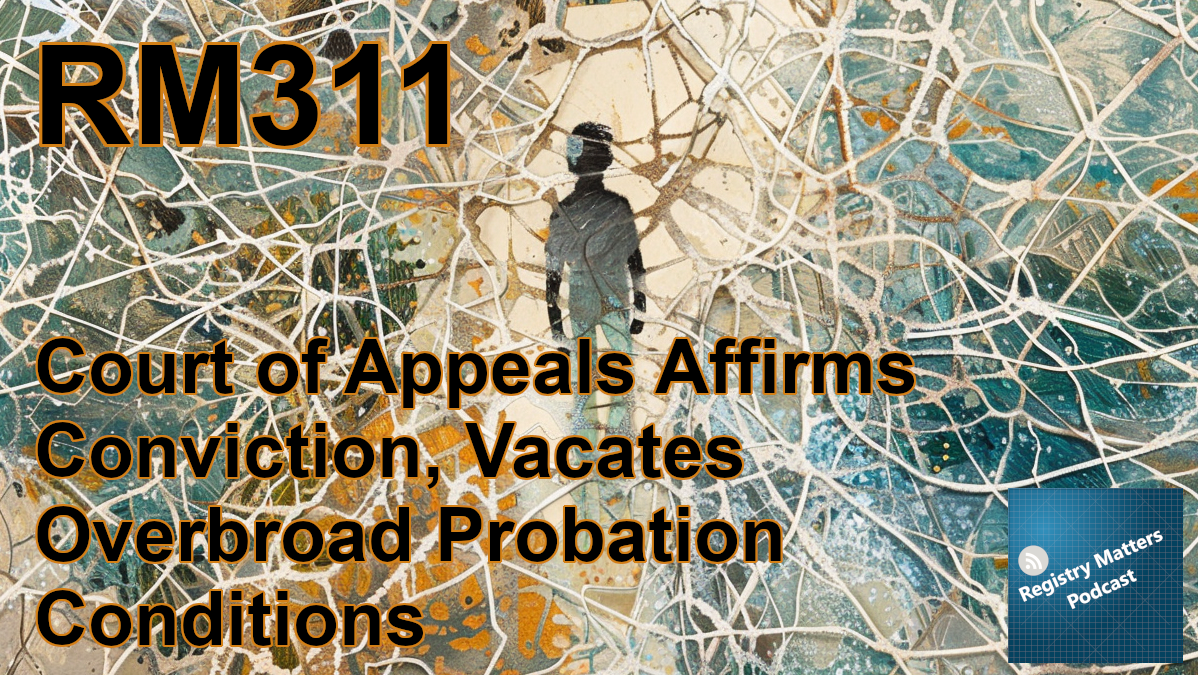In this episode, we analyze a case from the Georgia Court of Appeals, focusing on conditions of supervision and the sufficiency of evidence. We also revisit Mississippi’s disenfranchisement of felons, highlighting its egregious nature. Additionally, we debunk a claim by a presidential candidate about rising crime rates in the U.S. through our educational segment. In our “California Corner,” we cover notable updates, and we follow up on last week’s audio question with a clarified response. Plus, we address a YouTube comment from our listeners. Tune in for a comprehensive and insightful discussion.
[4:44] Followup from John in Rhode Island [9:48] We discuss the case of Bryan v. State, where Joe Randall Bryan’s conviction for enticing a child was upheld by the Georgia Court of Appeals. Despite Bryan’s claims of insufficient evidence and unconstitutional probation conditions, the court affirmed the conviction but vacated some probation conditions. They highlighted the deference appellate courts give to jury verdicts and discussed the unconstitutionality of certain overbroad probation conditions, such as prohibiting all contact with minors and restricting relationships with individuals with minor children. The case was remanded for resentencing.https://law.justia.com/cases/georgia/court-of-appeals/2024/a24a0048.html [26:37] In this segment, we dive into several pressing topics. First, we examine an article from Reason.com debunking claims by a presidential candidate that crime rates are rising in the U.S., highlighting how data shows a decline in violent crime since the 1990s, except for a spike in 2020. We emphasize the importance of verifying news sources for accuracy and bias, using tools like Ad Fontes Media. Next, we discuss Mississippi’s longstanding disenfranchisement of felons, rooted in the 1890 constitution, and recent legislative efforts to change this. Finally, we address listener feedback and a YouTube comment, ensuring a well-rounded and informative episode.
https://reason.com/2024/07/24/promising-to-restore-law-and-order-trump-falsely-claims-crime-is-rising/ [43:37] In this episode’s “California Corner,” the hosts discuss SB1128, a bill aimed at making unlawful sexual intercourse with a minor (PC 261.5 (c) and (d)) subject to mandatory registration. Currently, these offenses are only subject to discretionary registration, but the bill proposes mandatory registration if the defendant is more than ten years older than the victim. The hosts explore the implications of this change, including potential retroactivity concerns that could impact thousands. They also discuss recommendations from the California Sex Offender Management Board to revise the tiered registry law, suggesting significant reclassifications for certain offenses based on re-offense rates and consistency. The discussion highlights the complexities and potential consequences of these legal changes, emphasizing the need for careful legislative consideration.
https://www.registrymatters.co/podcast/rm311-court-of-appeals-affirms-conviction-vacates-overbroad-probation-conditions
Leave voicemail: 747-227-4477
Email us: registrymatterscast@gmail.com
Support us on Patreon: https://www.patreon.com/registrymatters
Join the Discord server: https://discord.gg/6FnxwAQm57
Want to support Registry Matters with some swag: https://shop.spreadshirt.com/registry-matters
Apple Podcasts: https://itunes.apple.com/us/podcast/registry-matters/id1305039280
Google Play Music: https://play.google.com/music/listen?u=0#/ps/Icuxbpzvyti7wtoredipbtiojqy
RSS: https://www.registrymatters.co/feed/podcast/
Spotify: https://open.spotify.com/show/3d75P7Kc37n2l79m89F9KI
YouTube: https://www.youtube.com/registrymatters
The Registry Matters Podcast’s mission is to cover issues surrounding the Registry. We cover cases that will peel back the veneer of what we need to do to change our lives for the better. We cover news articles that spark conversations about the total insanity of this modern day witch hunt. This podcast will call out bad policy and call out those that are making bad policy.
To change things for the positive, we need to act. We are 6-7-8-900k strong. With that many people, plus their friends and family, over a million people are affected by the registry. We should be able to secure donations to hire lawyers and lobbyists to move the agenda in our favor. We need our people to be represented.


Leave a Comment